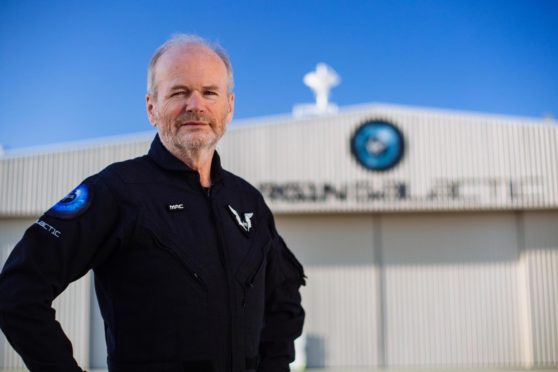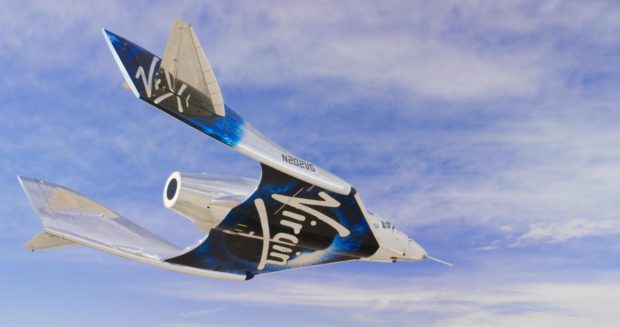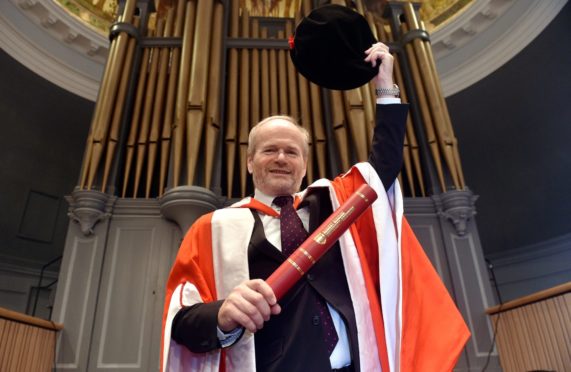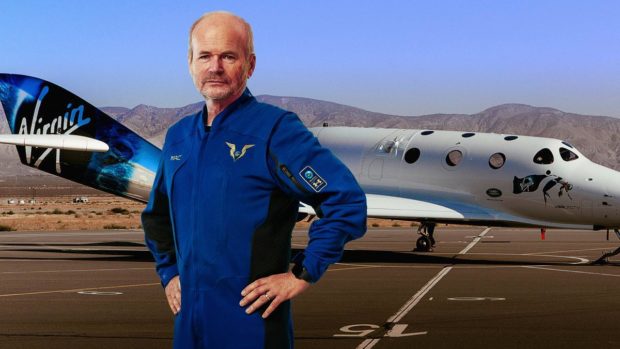Earlier this year, Dave Mackay got his second opportunity to look at the deserts of the south-western United States from 55 miles in the air.
It was a little over two years since he’d last crossed the NASA-designated boundary of 50 miles and become the first native-born Scot in space, and again the colours were what stood out to him most.
“The big deal, as you look out the window, is the contrast between this densely black sky, which is a bit strange, because you’re outside the atmosphere and the sun is incredibly bright,” he said.
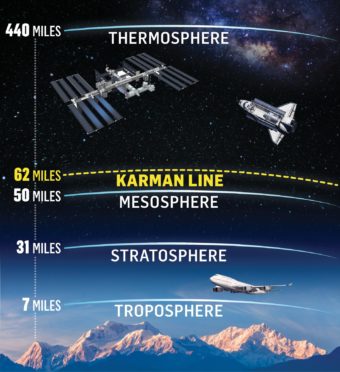
“You’re looking at that dense black sky and there’s this beautiful colour of atmosphere, an extremely thin band of beautiful, beautiful blue.
“And that was contrasted with these incredible oranges. You know, those beautiful, rust-type colours on the ground with dotted white clouds above.
“It’s just an incredible scene. It is a remarkable thing to see.”
As chief pilot for Virgin Galactic, Mr Mackay remains the only person born in Scotland to have had the privilege of that view – the only saltire on the Wikipedia list of the more than 600 people who can call themselves astronauts.
That remarkable fact is strengthened by a couple of other seemingly incongruous facts about him, the first of which is the normality of his childhood in the Highlands.
Eyes on the sky
Mr Mackay’s father was a policeman, including a spell in the military during the Second World War, and the family moved around several different places for his work before settling in Helmsdale on the Sutherland coast.
He said: “I think I always appreciated the the space up there – there aren’t many people, there’s a lot of open space, and in my village you had the open expanse of the Moray Firth up there.
“It’s a fantastic place to be brought up. It’s very small community, in those small communities everybody knows everybody else.
“Everybody knew who you were so it was like one big family, looking after you, keeping an eye on you, making sure you weren’t getting up things you shouldn’t be getting up to.”
Like many children his age (he was born in 1957), Mr Mackay grew up watching the Apollo missions and dreaming of being able to go into space – although a more immediate appeal was the RAF jets from Lossiemouth that would frequently fly overhead.
When he was around 16, he wrote a letter to legendary Scottish test pilot Duncan Simpson asking how he could get that same job, and received an extensive response detailing the career path he should take.
Path to becoming astronaut
Diligently, he went on to study Aeronautical Engineering at Glasgow University before joining the RAF.
Eight years later he was a test pilot, and it was Mr Mackay who was flying fast over Helmsdale.
On one memorable day, he was testing a Buccaneer and decided to use up excess fuel by performing a flypast for his mother and his father, who had retired from the police and taken up a role as a gillie on the River Helmsdale.
Mr Mackay said: “My mother was on the doorstep waving. And my father, I knew he was on the river fishing this day.
“And so I flew up to the river, the way that I’d watched these Buccaneers do many times in the past as a child.
“I saw my father’s car parked there, but I didn’t I didn’t see him at all.
“I gave him a call that night, and he said he was just helping this 80-year-old man across the river – he was relatively old himself at this stage.
“When I flew overhead, I came from behind at a low level, and it’s a pretty noisy aircraft.
“And my father tells his story that this old man nearly fell over in the river, he was holding on to him, and he said, ‘What the bloody hell was that?!’
“And my father said ‘That was my son.'”
Mr Mackay’s father was into machines – a “tinkerer”, he says – and a lot more adventurous than his mother, who only flew once in her life when she was in her 80s. She died at home in the Highland village just over a year ago, aged 96.
Breaking the boundary
Mr Mackay joined Virgin Atlantic in 1995 after leaving the RAF, and it was in a venue befitting the glamour of a transatlantic pilot that the next chapter in his life began.
In a bar in Hong Kong in early 2004, he bumped into a man called Alex Tai, who was playing a role in Steve Fossett’s Virgin-sponsored nonstop solo flight around the world.
Knowing Mr Mackay’s credentials, Mr Tai showed him a technical document from a nascent project which would, over the following months and years, become Virgin Galactic – and Mr Mackay got involved from the very start.
After having taken on the role of chief pilot, it took his fellow Virgin pilot Brian Binnie – who spent much of his childhood in Aberdeenshire and Stirling – to point out the obvious.
Mr Mackay said: “I remember him telling me once, he said, ‘You will be the first real Scot in space.’ And, you know, I didn’t think much more about that.
“But then as I was approaching that flight, several people said to me, ‘You’re going to be the first person in space from Scotland, why don’t we do something?'”
The suggestion was taken on board.
On February 22, 2019, Mr Mackay first broke the 50-mile barrier, declaring ‘Welcome to space, Scotland’ as he did so – and was greeted on touchdown by a bagpiper in full Highland regalia and a glass of Scotch.
Homeland recognition
This leads to the second seemingly incongruous fact about Mr Mackay – despite his impressive and historic achievement, and the celebrations that marked his first spaceflight, he is still not a household name.
Does he wish there was more recognition of his accomplishment in Scotland?
“That’s not a concern of mine, really,” he said.
“I think there’s there is a lot going on in aerospace in Scotland, and I think that’s a great thing. I think there’s a lot of talent in Scotland.
“As a small nation, we’ve achieved some great things with science and technology in the past, and maybe we’re not as proud of that – or maybe we’re not as aware of that – as we should be.”
One part of the country that does celebrate Mr Mackay is his native Sutherland. In the spring of 2019 he returned to give a number of talks to local schoolchildren and inspire them the way test pilot Duncan Simpson inspired him.
With a spaceport planned near Tongue on the far north coast of the region, that encouragement could put some of those children on the path to seeing the planet’s colours from space themselves.
Making no secret of his love for his home, Mr Mackay will be back to visit when he next gets the opportunity.
He said: “I want to come back to Scotland at least once a year, if not more often.
“Of course, last year was really bad. It’s still looking difficult now, but I definitely want to come back this year. I’m missing the place, yeah.”
